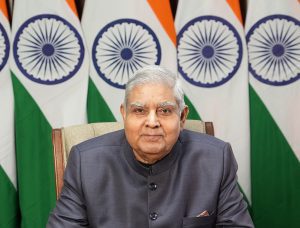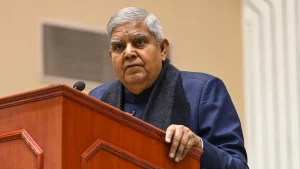The unexpected Jagdeep Dhankhar resignation from the office of Vice President has sent shockwaves through India’s political landscape, particularly among the influential Jat community, who view this development as a deliberate attempt to sideline their representation in key constitutional positions. The resignation, officially attributed to health concerns, has created a significant political vacuum that opposition parties, especially Congress, are strategically positioning themselves to exploit.
— Vice-President of India (@VPIndia) July 21, 2025
Jagdeep Dhankhar resignation
Also Read: Jagdeep Dhankar resigns due to Health Issues?
The Jagdeep Dhankhar resignation came as a surprise to many political observers, considering his recent public statements about serving until his term’s completion in August 2027. In his resignation letter to President Droupadi Murmu, Dhankhar invoked Article 67(a) of the Constitution, stating his decision to prioritise healthcare and follow medical advice. However, political analysts suggest that Jagdeep Dhankhar’s resignation may have deeper undercurrents beyond the stated health reasons.

The timing of the resignation has particularly raised eyebrows, as Dhankhar had been increasingly vocal about parliamentary procedures and had shown signs of asserting his constitutional authority as Rajya Sabha Chairman. Sources close to the development indicate that tensions had been brewing between the Vice President’s office and the ruling establishment over various procedural matters and the handling of opposition concerns in the Upper House.
The Jagdeep Dhankhar resignation has triggered significant unrest within the Jat community, which constitutes a substantial vote bank across several northern states, including Haryana, Rajasthan, and western Uttar Pradesh. Community leaders express concern that the resignation represents a systematic attempt to diminish Jat representation in high constitutional offices, viewing it as political sidelining rather than a genuine health-related decision.
Prominent Jat leaders have begun questioning whether Jagdeep Dhankhar’s resignation signals a broader strategy to marginalise their community’s political influence. The community, which has historically played a crucial role in electoral politics, particularly in Haryana and Rajasthan, sees Dhankhar’s departure as a loss of their voice in the nation’s second-highest constitutional office.
The political ramifications of Jagdeep Dhankhar’s resignation extend beyond community politics, as it creates an opportunity for opposition parties to challenge the ruling party’s commitment to inclusive representation. The Jat community’s concerns about political marginalisation could potentially influence voting patterns in upcoming state elections, particularly in regions where they hold significant demographic influence.
The Congress party has swiftly moved to capitalise on the political fallout from Jagdeep Dhankhar’s resignation, with senior leaders framing the development within the broader narrative of systematic exclusion of agricultural communities from positions of power. Congress leaders, including those from the Jat community, have begun reaching out to community leaders to build a coalition based on shared concerns about political representation.


The opposition party’s response to Jagdeep Dhankhar’s resignation demonstrates their intent to transform what appears to be an individual political development into a broader community mobilisation issue. Congress leaders have been particularly vocal about questioning the circumstances surrounding the resignation, suggesting that there may be more to the story than the officially stated health concerns.
The resignation of Jagdeep Dhankhar has initiated the constitutional process for selecting a new Vice President, which involves an electoral college comprising members of both Houses of Parliament. This process typically takes several weeks to complete, during which the Rajya Sabha will need to elect a temporary Chairman to conduct its proceedings.
The vacancy created by Jagdeep Dhankhar’s resignation also raises questions about the selection criteria for future Vice Presidents, particularly regarding the balance between political considerations and community representation. The ruling party will need to navigate carefully to address concerns about inclusive representation while maintaining its political objectives.
Opposition leaders have indicated their intention to use the Vice Presidential election process as an opportunity to highlight issues of representation and constitutional propriety. The election campaign for Dhankhar’s successor could become a platform for broader political debates about federalism, parliamentary procedures, and community representation.
The immediate political reactions to Jagdeep Dhankhar’s resignation have been mixed, with ruling party leaders expressing support for his decision while opposition parties raise questions about the timing and circumstances. Several opposition MPs who had previously clashed with Dhankhar during parliamentary proceedings have now praised his tenure, creating an interesting political dynamic.
The long-term implications of Jagdeep Dhankhar’s resignation could extend well beyond the immediate constitutional vacancy. The development has potential ramifications for community politics, electoral strategies, and the broader discourse about representation in constitutional offices. The Jat community’s response to this development could influence political alignments in key states.
The Jagdeep Dhankhar resignation represents more than just a change in constitutional office; it symbolises the complex interplay between community politics, constitutional responsibilities, and strategic political manoeuvring. As the nation moves forward with the process of selecting a new Vice President, the political parties must address the underlying concerns about representation and inclusivity that this resignation has brought to the forefront.
The ultimate impact of Jagdeep Dhankhar’s resignation will depend on how effectively different political parties can mobilise community sentiment and translate it into electoral advantage. For the Jat community, this moment represents both a challenge to their political influence and an opportunity to reassert their importance in national politics. The coming months will reveal whether this resignation becomes a catalyst for broader political realignment or remains an isolated constitutional development.

